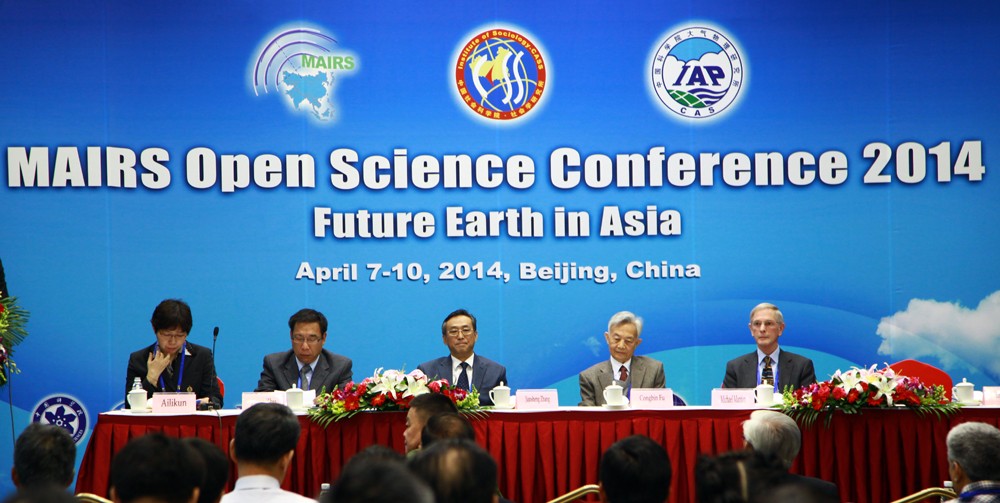The Asian monsoon region is uniquely affected by global climate change, drawing international attention to the magnitude and scale of climate variations and their impacts on the nations of the region. The MAIRS (Monsoon Asia Integrated Regional Studies) programme was established in 2006 to specifically address the interactions between climate and human systems in the monsoon Asia region, using interdisciplinary approaches to integrate research on human communities, climate and ecosystems. By focusing on the integrated studies in three vulnerable zones (Coastal Urban, Mountain, and Dryland), the MAIRS programme has achieved a significant understanding how the climate-human system interacts but at the same time identified knowledge gaps.
The Monsoon Asia Integrated Regional Study (MAIRS) Open Science Conference was held at Beijing Friendship Hotel, April 7-10, 2014 with over 200 participants, among which nearly half are from overseas, and about120 are students and early careers researchers. The conference is organized by Monsoon Asia Integrated Regional Study (MAIRS), Institute of Sociology, Chinese Academy of Social Sciences (CASS), Institute of Atmospheric Physics (IAP), Chinese Academy of Sciences (CAS) and sponsored by Chinese Academy of Sciences (CAS), Asia-Pacific Network for Global Change Research (APN), China Association for Science And Technology (CAST), National Science Foundation of China (NSFC), CAS Key Laboratory for Regional Climate-Environment for East Asia (RCE-TEA), Research Institute for Humanity and Nature (RIHN), ICSU Regional Office for Asia and the Pacific (ICSU-ROAP), World Climate Research Program (WCRP), Land-Ocean Interactions in the Coastal Zone (LOICZ), Key Laboratory for Semi-Arid Climate Change of the Ministry of Education, College of Atmospheric Sciences, Lanzhou University (SACOL).
The conference presents 19 keynotes on themes of Asian Monsoon, Changes and Feedbacks under Global Change, Dynamic Asia, Asian Development, and Transformation to Sustainable Development. Topics cover agriculture, chemistry, climate, ecology, economics, energy, geography, hydrology, remote sensing, and social science. It also includes 26 parallel sessions on various topics with 150 oral presentations and 60 posters.
Needs for Integrated Research are disused during the conference and with agreements that continuing researches collaborations on integrated regional studies across mountain, dryland, coastal and urban zones of Asia; reduction in uncertainties in modeling on decadal time scales; enhanced interface between model outputs and user applications; enhanced data sharing, including bio-geo-physical and socio-economic; enhanced consistency of monitoring practices, managing uncertainties in observations and model outputs; management of anthropogenic and natural disasters; nexus between water, energy and food resources; nexus between ecosystem services and human well-being; social equity underpinning future sustainability.
The Conference is closed with the summary conclusions that some move from sustainability concept to implementation is challenge; co-design, co-production, co-implementation should enhance effectiveness of research; Future Earth has potential to provide framework for sustainability research and action; and MAIRS had laid sound foundation for future research across Asia.

open ceremony of the conference

group photo
